- Home
- Christopher Paolini
Brisingr [en] i-3 Page 2
Brisingr [en] i-3 Read online
Page 2
Two more priests jumped forward to catch the crimson flow in goblets that, when filled to the rim, were distributed among the members of the congregation, who eagerly drank.
“Gar!” said Roran in an undertone. “You failed to mention that those errant flesh-mongers, those gore-bellied, boggle-minded idiotworshipers were cannibals.”
“Not quite. They do not partake of the meat.”
When all the attendees had wet their throats, the servile novitiates returned the High Priest to the litter and bound the creature’s shoulders with strips of white linen. Wet blotches quickly sullied the virgin cloth.
The wounds seemed to have no effect upon the High Priest, for the limbless figure rotated back toward the devotees with their lips of cranberry red and pronounced, “Now are you truly my Brothers and Sisters, having tasted the sap of my veins here in the shadow of almighty Helgrind. Blood calls to blood, and if ever your Family should need help, do then what you can for the Church and for others who acknowledge the power of our Dread Lord... To affirm and reaffirm our fealty to the Triumvirate, recite with me the Nine Oaths... By Gorm, Ilda, and Fell Angvara, we vow to perform homage at least thrice a month, in the hour before dusk, and then to make an offering of ourselves to appease the eternal hunger of our Great and Terrible Lord... We vow to observe the strictures as they are presented in the book of Tosk... We vow to always carry our Bregnir on our bodies and to forever abstain from the twelve of twelves and the touch of a many-knotted rope, lest it corrupt...”
A sudden rise in the wind obscured the rest of the High Priest’s list. Then Eragon saw those who listened take out a small, curved knife and, one by one, cut themselves in the crook of their elbows and anoint the altar with a stream of their blood.
Some minutes later, the angry breeze subsided and Eragon again heard the priest: “... and such things as you long and lust for will be granted to you as a reward for your obedience... Our worship is complete. However, if any now stand among you who are brave enough to demonstrate the true depth of their faith, let them show themselves!”
The audience stiffened and leaned forward, their faces rapt; this, apparently, was what they had been waiting for.
For a long, silent pause, it seemed as if they would be disappointed, but then one of the acolytes broke ranks and shouted, “I will!” With a roar of delight, his brethren began to brandish their bells in a quick and savage beat, whipping the congregation into such a frenzy, they jumped and yelled as if they had taken leave of their senses. The rough music kindled a spark of excitement in Eragon’s heart — despite his revulsion at the proceedings — waking some primal and brutish part of him.
Shedding his gold robes so that he wore nothing but a leather breechcloth, the dark-haired youth sprang on top of the altar. Gouts of ruby spray erupted on either side of his feet. He faced Helgrind and began to shiver and quake as if stricken with palsy, keeping time with the tolling of the cruel iron bells. His head rolled loosely upon his neck, foam gathered at the corners of his mouth, his arms thrashed like snakes. Sweat oiled his muscles until he gleamed like a bronze statue in the dying light.
The bells soon reached a manic tempo where one note clashed against another, at which point the young man thrust a hand out behind himself. Into it, a priest deposited the hilt of a bizarre implement: a single-edged weapon, two and a half feet long, with a full tang, scale grips, a vestigial crossguard, and a broad, flat blade that widened and was scalloped near the end, a shape reminiscent of a dragon wing. It was a tool designed for but one purpose: to hack through armor and bones and sinew as easily as through a bulging waterskin.
The young man lifted the weapon so that it slanted toward the highest peak of Helgrind. Then he dropped to one knee and, with an incoherent cry, brought the blade down across his right wrist.
Blood sprayed the rocks behind the altar.
Eragon winced and averted his eyes, although he could not escape the youth’s piercing screams. It was nothing Eragon had not seen in battle, but it seemed wrong to deliberately mutilate yourself when it was so easy to become disfigured in everyday life.
Blades of grass rasped against one another as Roran shifted his weight. He muttered some curse, which was lost in his beard, and then fell silent again.
While a priest tended to the young man’s wound — stanching the bleeding with a spell — an acolyte let loose two slaves from the High Priest’s litter, only to chain them by the ankles to an iron loop embedded in the altar. Then the acolytes divested themselves of numerous packages from underneath their robes and piled them on the ground, out of reach of the slaves.
Their ceremonies at an end, the priests and their retinue departed Helgrind for Dras-Leona, wailing and ringing the entire way. The now one-handed zealot stumbled along just behind the High Priest.
A beatific smile graced his face.
“Well,” said Eragon, and released his pent-up breath as the column vanished behind a distant hill.
“Well what?”
“I’ve traveled among both dwarves and elves, and nothing they did was ever as strange as what those people, those humans, do.”
“They’re as monstrous as the Ra’zac.” Roran jerked his chin toward Helgrind. “Can you find out now if Katrina is in there?”
“I’ll try. But be ready to run.”
Closing his eyes, Eragon slowly extended his consciousness outward, moving from the mind of one living thing to another, like tendrils of water seeping through sand. He touched teeming cities of insects frantically scurrying about their business, lizards and snakes hidden among warm rocks, diverse species of songbirds, and numerous small mammals. Insects and animals alike bustled with activity as they prepared for the fast-approaching night, whether by retreating to their various dens or, in the case of those of a nocturnal bent, by yawning, stretching, and otherwise readying themselves to hunt and forage.
Just as with his other senses, Eragon’s ability to touch another being’s thoughts diminished with distance. By the time his psychic probe arrived at the base of Helgrind, he could perceive only the largest of animals, and even those but faintly.
He proceeded with caution, ready to withdraw at a second’s notice if he happened to brush against the minds of their prey: the Ra’zac and the Ra’zac’s parents and steeds, the gigantic Lethrblaka. Eragon was willing to expose himself in this manner only because none of the Ra’zac’s breed could use magic, and he did not believe that they were mindbreakers — nonmagicians trained to fight with telepathy. The Ra’zac and Lethrblaka had no need for such tricks when their breath alone could induce a stupor in the largest of men.
And though Eragon risked discovery by his ghostly investigation, he, Roran, and Saphira had to know if the Ra’zac had imprisoned Katrina — Roran’s betrothed — in Helgrind, for the answer would determine whether their mission was one of rescue or one of capture and interrogation.
Eragon searched long and hard. When he returned to himself, Roran was watching him with the expression of a starving wolf. His gray eyes burned with a mixture of anger, hope, and despair that was so great, it seemed as if his emotions might burst forth and incinerate everything in sight in a blaze of unimaginable intensity, melting the very rocks themselves.
This Eragon understood.
Katrina’s father, the butcher Sloan, had betrayed Roran to the Ra’zac. When they failed to capture him, the Ra’zac had instead seized Katrina from Roran’s bedroom and spirited her away from Palancar Valley, leaving the inhabitants of Carvahall to be killed and enslaved by King Galbatorix’s soldiers. Unable to pursue Katrina, Roran had — just in time — convinced the villagers to abandon their homes and to follow him across the Spine and then south along the coast of Alagaësia, where they joined forces with the rebel Varden. The hardships they endured as a result had been many and terrible. But circuitous as it was, that course had reunited Roran with Eragon, who knew the location of the Ra’zac’s den and had promised to help save Katrina.
Roran had only succeeded, as he
later explained, because the strength of his passion drove him to extremes that others feared and avoided, and thus allowed him to confound his enemies.
A similar fervor now gripped Eragon.
He would leap into harm’s way without the slightest regard for his own safety if someone he cared for was in danger. He loved Roran as a brother, and since Roran was to marry Katrina, Eragon had extended his definition of family to include her as well. This concept seemed even more important because Eragon and Roran were the last heirs of their line. Eragon had renounced all affiliation with his birth brother, Murtagh, and the only relatives he and Roran had left were each other, and now Katrina.
Noble sentiments of kinship were not the only force that drove the pair. Another goal obsessed them as well: revenge! Even as they plotted to snatch Katrina from the grasp of the Ra’zac, so the two warriors — mortal man and Dragon Rider alike — sought to slay King Galbatorix’s unnatural servants for torturing and murdering Garrow, who was Roran’s father and had been as a father to Eragon.
The intelligence, then, that Eragon had gleaned was as important to him as to Roran.
“I think I felt her,” he said. “It’s hard to be certain, because we’re so far from Helgrind and I’ve never touched her mind before, but I think she’s in that forsaken peak, concealed somewhere near the very top.”
“Is she sick? Is she injured? Blast it, Eragon, don’t hide it from me: have they hurt her?”
“She’s in no pain at the moment. More than that, I cannot say, for it required all my strength just to make out the glow of her consciousness; I could not communicate with her.” Eragon refrained from mentioning, however, that he had detected a second person as well, one whose identity he suspected and the presence of whom, if confirmed, troubled him greatly. “What I didn’t find were the Ra’zac or the Lethrblaka. Even if I somehow overlooked the Ra’zac, their parents are so large, their life force should blaze like a thousand lanterns, even as Saphira’s does. Aside from Katrina and a few other dim specks of light, Helgrind is black, black, black.”
Roran scowled, clenched his left fist, and glared at the mountain of rock, which was fading into the dusk as purple shadows enveloped it. In a low, flat voice, as if talking with himself, he said, “It doesn’t matter whether you are right or wrong.”
“How so?”
“We dare not attack tonight; night is when the Ra’zac are strongest, and if they are nearby, it would be stupid to fight them when we’re at a disadvantage. Agreed?”
“Yes.”
“So, we wait for the dawn.” Roran gestured toward the slaves chained to the gory altar. “If those poor wretches are gone by then, we know the Ra’zac are here, and we proceed as planned. If not, we curse our bad luck that they escaped us, free the slaves, rescue Katrina, and fly back to the Varden with her before Murtagh hunts us down. Either way, I doubt the Ra’zac will leave Katrina unattended for long, not if Galbatorix wants her to survive so he can use her as a tool against me.”
Eragon nodded. He wanted to release the slaves now, but doing so could warn their foes that something was amiss. Nor, if the Ra’zac came to collect their dinner, could he and Saphira intercede before the slaves were ferried away. A battle in the open between a dragon and creatures such as the Lethrblaka would attract the attention of every man, woman, and child for leagues around. And Eragon did not think he, Saphira, or Roran could survive if Galbatorix learned they were alone in his empire.
He looked away from the shackled men. For their sake, I hope the Ra’zac are on the other side of Alagaësia or, at least, that the Ra’zac aren’t hungry tonight.
By unspoken consent, Eragon and Roran crawled backward down from the crest of the low hill they were hiding behind. At the bottom, they rose into a half crouch, then turned and, still doubled over, ran between two rows of hills. The shallow depression gradually deepened into a narrow, flood-carved gully lined with crumbling slabs of shale.
Dodging the gnarled juniper trees that dotted the gully, Eragon glanced up and, through clumps of needles, saw the first constellations to adorn the velvet sky. They seemed cold and sharp, like bright shards of ice. Then he concentrated on maintaining his footing as he and Roran trotted south toward their camp.
AROUND THE CAMPFIRE
The low mound of coals throbbed like the heart of some giant beast. Occasionally, a patch of gold sparks flared into existence and raced across the surface of the wood before vanishing into a white-hot crevice.
The dying remnants of the fire Eragon and Roran had built cast a dim red light over the surrounding area, revealing a patch of rocky soil, a few pewter-gray bushes, the indistinct mass of a juniper tree farther off, then nothing.
Eragon sat with his bare feet extended toward the nest of ruby embers — enjoying the warmth — and with his back propped against the knobby scales of Saphira’s thick right foreleg. Opposite him, Roran was perched on the iron-hard, sun-bleached, wind-worn shell of an ancient tree trunk. Every time he moved, the trunk produced a bitter shriek that made Eragon want to claw at his ears.
For the moment, quiet reigned within the hollow. Even the coals smoldered in silence; Roran had collected only long-dead branches devoid of moisture to eliminate any smoke that unfriendly eyes might spot.
Eragon had just finished recounting the day’s activities to Saphira. Normally, he never had to tell her what he had been doing, as thoughts, feelings, and other sensations flowed between them as easily as water from one side of a lake to another. But in this instance it was necessary because Eragon had kept his mind carefully shielded during the scouting expedition, aside from his disembodied foray into the Ra’zac’s lair.
After a considerable gap in the conversation, Saphira yawned, exposing her rows of many fearsome teeth. Cruel and evil they may be, but I am impressed that the Ra’zac can bewitch their prey into wanting to be eaten. They are great hunters to do that... Perhaps I shall attempt it someday.
But not, Eragon felt compelled to add, with people. Try it with sheep instead.
People, sheep: what difference is there to a dragon? Then she laughed deep in her long throat — a rolling rumble that reminded him of thunder.
Leaning forward to take his weight off Saphira’s sharp-edged scales, Eragon picked up the hawthorn staff that lay by his side. He rolled it between his palms, admiring the play of light over the polished tangle of roots at the top and the much-scratched metal ferrule and spike at the base.
Roran had thrust the staff into his arms before they left the Varden on the Burning Plains, saying, “Here. Fisk made this for me after the Ra’zac bit my shoulder. I know you lost your sword, and I thought you might have need of it... If you want to get another blade, that’s fine too, but I’ve found there are very few fights you can’t win with a few whacks from a good, strong stick.” Remembering the staff Brom had always carried, Eragon had decided to forgo a new sword in favor of the length of knotted hawthorn. After losing Zar’roc, he felt no desire to take up another, lesser sword. That night, he had fortified both the knotted hawthorn and the handle to Roran’s hammer with several spells that would prevent either piece from breaking, except under the most extreme stress.
Unbidden, a series of memories overwhelmed Eragon: A sullen orange and crimson sky swirled around him as Saphira dove in pursuit of the red dragon and his Rider. Wind howled past his ears... His fingers went numb from the jolt of sword striking sword as he dueled that same Rider on the ground... Tearing off his foe’s helm in the midst of combat to reveal his once friend and traveling companion, Murtagh, whom he had thought dead... The sneer upon Murtagh’s face as he took Zar’roc from Eragon, claiming the red sword by right of inheritance as Eragon’s elder brother...
Eragon blinked, disoriented as the noise and fury of battle faded and the pleasant aroma of juniper wood replaced the stench of blood. He ran his tongue over his upper teeth, trying to eradicate the taste of bile that filled his mouth.
Murtagh.
The name alone generated a welt
er of confused emotions in Eragon. On one hand, he liked Murtagh. Murtagh had saved Eragon and Saphira from the Ra’zac after their first, ill-fated visit to Dras-Leona; risked his life to help extricate Eragon from Gil’ead; acquitted himself honorably in the Battle of Farthen Dûr; and, despite the torments he no doubt endured as a result, had chosen to interpret his orders from Galbatorix in a way that allowed him to release Eragon and Saphira after the Battle of the Burning Plains instead of taking them captive. It was not Murtagh’s fault that the Twins had abducted him; that the red dragon, Thorn, had hatched for him; or that Galbatorix had discovered their true names, with which he extracted oaths of fealty in the ancient language from both Murtagh and Thorn.
None of that could be blamed on Murtagh. He was a victim of fate, and had been since the day he was born.
And yet... Murtagh might serve Galbatorix against his will, and he might abhor the atrocities the king forced him to commit, but some part of him seemed to revel in wielding his newfound power. During the recent engagement between the Varden and the Empire on the Burning Plains, Murtagh had singled out the dwarf king, Hrothgar, and slain him, although Galbatorix had not ordered Murtagh to do so. He had let Eragon and Saphira go, yes, but only after defeating them in a brutal contest of strength and then listening to Eragon plead for their freedom.
And Murtagh had derived entirely too much pleasure from the anguish he inflicted upon Eragon by revealing they were both sons of Morzan — first and last of the thirteen Dragon Riders, the Forsworn, who had betrayed their compatriots to Galbatorix.

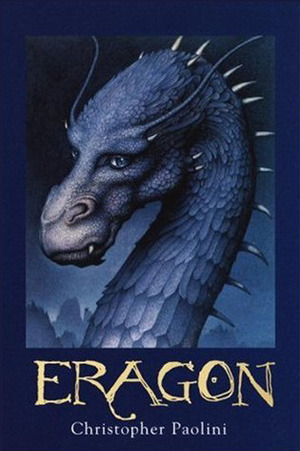 Eragon
Eragon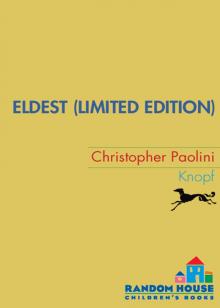 Eldest
Eldest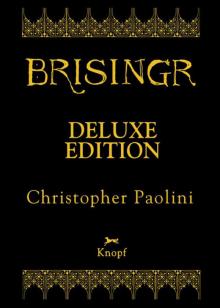 Brisingr
Brisingr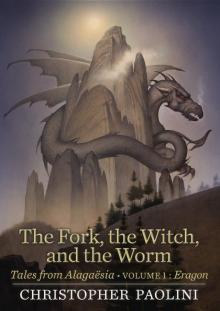 The Fork, the Witch, and the Worm
The Fork, the Witch, and the Worm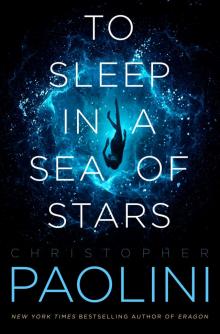 To Sleep in a Sea of Stars
To Sleep in a Sea of Stars![Eldest [en] i-2 Read online](http://i1.bookreadfree.com/i/03/19/eldest_en_i-2_preview.jpg) Eldest [en] i-2
Eldest [en] i-2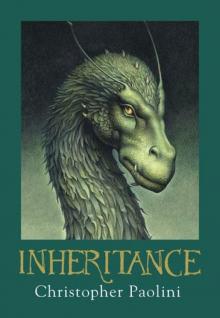 Inheritance i-4
Inheritance i-4![Brisingr [en] i-3 Read online](http://i1.bookreadfree.com/i1/03/31/brisingr_en_i-3_preview.jpg) Brisingr [en] i-3
Brisingr [en] i-3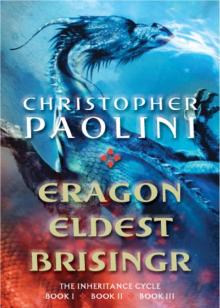 Inheritance Cycle Omnibus
Inheritance Cycle Omnibus